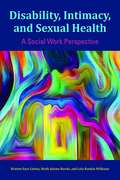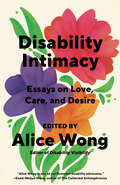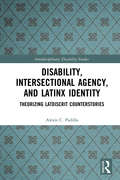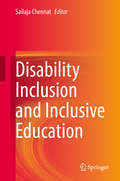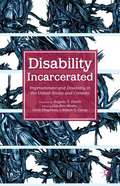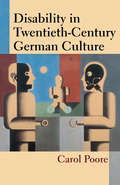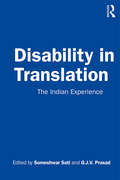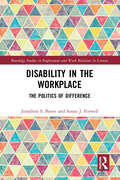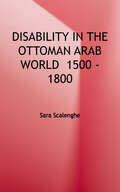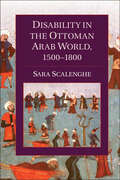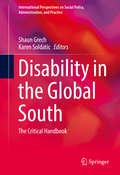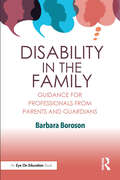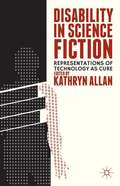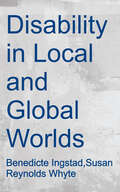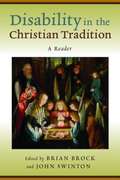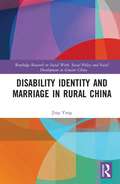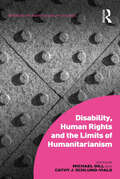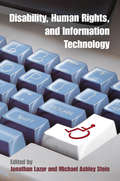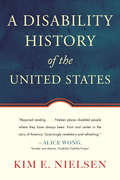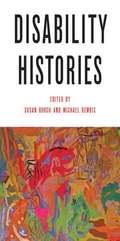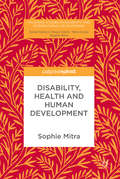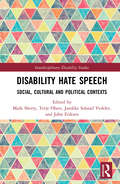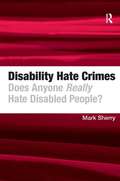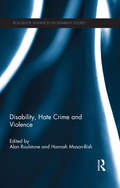- Table View
- List View
Disability, Intimacy, and Sexual Health: A Social Work Perspective
by Kristen Faye Linton Heidi Adams Rueda Lela Rankin Williams"Sexuality is a key aspect of human development and identity, yet people with disabilities frequently encounter social and political barriers to achieving healthy, autonomous intimate relationships. Society tends to associate disability with asexuality and often labels sexual behaviors among people with disabilities as problematic or deviant. Faced with these assumptions and resultant policies, how can social workers meet the needs of this diverse population across the life course? In this book, Linton, Adams Rueda, and Rankin Williams compile comprehensive research and candid interviews with social workers to explore the complicated intersection of disability and sexuality. The book begins by detailing historical violations of the sexual and reproductive rights of people with disabilities, including forced castration and sterilization. It then explores current issues of sexuality and disability throughout the life course, starting with childhood and adolescence. The authors examine the increased risk of abuse and victimization that people with disabilities face while in romantic or sexual relationships and provide practice recommendations to help combat factors that contribute to this vulnerability. Other milestones across the life course are also explored, such as pregnancy and parenting, marriage and cohabitation, and intimacy in older adulthood. Throughout the book, the authors examine the micro, meso, and macro systems that affect the lives and relationships of people with disabilities. This book touches on psychiatric, intellectual, developmental, learning, neurological, and physical disabilities and gives voice to both practitioners and their clients. It's an unflinching look at the pressing challenges professionals can face while serving people with disabilities, essential for students, academics, policymakers, and practitioners in a variety of settings who wish to advocate for the full sexual citizenship of people with disabilities"--The publisher.
Disability Intimacy: Essays on Love, Care, and Desire
by Edited by Alice WongThe much-anticipated follow up to the groundbreaking anthology Disability Visibility: another revolutionary collection of first-person writing on the joys and challenges of the modern disability experience, and intimacy in all its myriad forms.What is intimacy? More than sex, more than romantic love, the pieces in this stunning and illuminating new anthology offer broader and more inclusive definitions of what it can mean to be intimate with another person. Explorations of caregiving, community, access, and friendship offer us alternative ways of thinking about the connections we form with others—a vital reimagining in an era when forced physical distance is at times a necessary norm. But don't worry: there's still sex to consider—and the numerous ways sexual liberation intersects with disability justice. Plunge between these pages and you'll also find disabled sexual discovery, disabled love stories, and disabled joy. These twenty-five stunning original pieces—plus other modern classics on the subject, all carefully curated by acclaimed activist Alice Wong—include essays, photo essays, poetry, drama, and erotica: a full spectrum of the dreams, fantasies, and deeply personal realities of a wide range of beautiful bodies and minds. Disability Intimacy will free your thinking, invigorate your spirit, and delight your desires.
Disability, Intersectional Agency, and Latinx Identity: Theorizing LatDisCrit Counterstories (Interdisciplinary Disability Studies)
by Alexis PadillaThis interdisciplinary volume links dis/ability and agency by exploring LatDisCrit’s theory and activist emancipatory practice. It uses the author’s experiential and analytical views as a blind brown Latinx engaged scholar and activist from the global south living and struggling in the highly racialized global north context of the United States. LatDisCrit integrates critically LatCrit and DisCrit which look at the interplay of race/ethnicity, diasporic cultures, historical sociopolitics and disability within multiple Latinx identities in mostly global north contexts, while incorporating global south epistemologies. Using intersectional analysis of key concepts through critical counterstories, following critical race theory methodological traditions, and engaging possible decoloniality treatments of material precarity and agency, this book emphasizes intersectionality’s complex underpinnings within and beyond Latinidades. Through a careful interplay of dis/ability identity and dis/ability rights/empowerment, the volume opens avenues for intersectional solidarity and spaces for radical transformational learning. This book will be of interest to all scholars and students working in disability studies; intersectional disability justice activists; critical Latinx/Chicanx studies; critical geographies; intersectional political philosophy; and political and public sociology.
Disability Inclusion and Inclusive Education
by Sailaja ChennatThe book approaches the topic of disability, inclusion and inclusive education in a holistic way including both academic and psycho-social perspectives. It also focuses on the contemporary status of disability studies with a multidisciplinary dimension. The experiences and challenges of children with disabilities and the different dimensions of inclusive education have been situated appropriately by including at the outset, a chapter on 'Disability Studies: The Context'. Chapter on 'Sociology of Disability' accentuates the tone and perspective of the presentations of the authors and editor. The research findings presented in the book indicate grounded realities and suggestions for transactional strategies which are plausible in the Indian context. It has never been timely to publish a book that helps professionals who work with schools, special education teachers, and counsellors to analyze disabilities from a socio-psychological perspective keeping the protagonist at the centre. Case narrations situated in the Indian context enrich the presentations giving voice to the marginalized children/adults with disabilities. This work serves as a comprehensive reference for the most prevalent disabilities at school education level covering the conceptual understanding about each disability, their psycho-social perspectives, implications for classroom transactions, suggestions of transactional strategies along with a brief explanation of assistive technology that can be used in case of each disability.With Right to Education Act (2009) in place, a diverse range of readers, from special educators and other teachers in schools, prospective teachers pursuing their pre service teacher education programmes, teacher educators and researchers in the field of disabilities and inclusive education will all find this volume useful, as a reference material with long shelf life.
Disability Incarcerated
by Liat Ben-Moshe Chris Chapman Allison C. CareyDisability Incarcerated gathers thirteen contributions from an impressive array of fields. Taken together, these essays assert that a complex understanding of disability is crucial to an understanding of incarceration, and that we must expand what has come to be called 'incarceration. ' The chapters in this book examine a host of sites, such as prisons, institutions for people with developmental disabilities, psychiatric hospitals, treatment centers, special education, detention centers, and group homes; explore why various sites should be understood as incarceration; and discuss the causes and effects of these sites historically and currently. This volume includes a preface by Professor Angela Y. Davis and an afterword by Professor Robert McRuer.
Disability in Twentieth-Century German Culture
by Carol PooreDisability in Twentieth-Century German Culture covers the entire scope of Germany's most tragic and tumultuous century---from the Weimar Republic to the current administration---revealing how central the notion of disability is to modern German cultural history. By examining a wide range of literary and visual depictions of disability, Carol Poore explores the contradictions of a nation renowned for its social services programs yet notorious for its history of compulsory sterilization and eugenic dogma. This comprehensive volume focuses particular attention on the horrors of the Nazi era, when those with disabilities were considered "unworthy of life," but also investigates other previously overlooked topics including the exile community's response to disability, socialism and disability in East Germany, current bioethical debates, and the rise and gains of Germany's disability rights movement. Richly illustrated, wide-ranging, and accessible, Disability in Twentieth-Century German Culture gives all those interested in disability studies, German studies, visual culture, Nazi history, and bioethics the opportunity to explore controversial questions of individuality, normalcy, citizenship, and morality. The book concludes with a memoir of the author's experiences in Germany as a person with a disability.
Disability in Translation: The Indian Experience
by Someshwar Sati G.J.V. PrasadThis volume explores how disability is seen, written about, read and understood through literature and translation. Foregrounding the asymmetrical world of power relations, it delves into the act of translation to exhibit how disability is constructed and deployed in language and culture. The essays in the volume reflect and theorise on experiences of translating various Indian-language stories (into English) which have disability as their subject. They focus on recovering and empowering marginal voices, as well as on the mechanics of translating idioms of disability. Furthermore, the book goes on to engage the reader to demonstrate how disability, and the space it occupies in our lives, can be reinforced or deconstructed in translation. A major intervention in translation and disability studies, this volume will be of great interest to scholars and researchers of literature, culture, and sociology.
Disability in the Workplace: The Politics of Difference (Routledge Studies in Employment and Work Relations in Context)
by Jonathon S. Breen Susan J. ForwellThis book introduces the difference model of disability. Framed within an affect-based understanding of the relationships between those living with impairments and others, this new model offers a reconsideration of the construct of disability itself. Disability is flexible, relational, and perceived through an acognitive lens. At a practice level, the difference model offers a framework for creating more positive and successful relationships between people with disabilities (PWDs) and others within the workplace. This includes two new tools, the Co-Worker Acceptance of Disabled Employees (CADE) Scale and the Perceived Barriers to Employing Persons with Disabilities (PBED) Scale. Designed to measure workplace attitudes, and changes to these attitudes, each of these scales provides empirical evidence in support of strategic planning and, ultimately, an increased representation of PWDs. Finally, this book considers the effects of language and technology on workplace attitudes toward disability.
Disability in the Ottoman Arab World, 1500-1800 (Cambridge Studies in Islamic Civilization Ser.)
by Sara ScalenghePhysical, sensory, and mental impairments can influence an individual's status in society as much as the more familiar categories of gender, class, religion, race, and ethnicity. This was especially true of the early modern Arab Ottoman world, where being judged able or disabled impacted every aspect of a person's life, including performance of religious ritual, marriage, job opportunities, and the ability to buy and sell property. Sara Scalenghe's book is the first on the history of both physical and mental disabilities in the Middle East and North Africa, and the first to examine disability in the non-Western world before the nineteenth century. Unlike previous scholarly works that examine disability as discussed in religious texts such as the Qur'an and the Hadith, this study focuses on representations and classifications of disability and impairment across a wide range of biographical, legal, medical, and divinatory primary sources.
Disability in the Ottoman Arab World, 1500-1800 (Cambridge Studies in Islamic Civilization)
by Sara ScalenghePhysical, sensory, and mental impairments can influence an individual's status in society as much as the more familiar categories of gender, class, religion, race, and ethnicity. This was especially true of the early modern Arab Ottoman world, where being judged able or disabled impacted every aspect of a person's life, including performance of religious ritual, marriage, job opportunities, and the ability to buy and sell property. Sara Scalenghe's book is the first on the history of both physical and mental disabilities in the Middle East and North Africa, and the first to examine disability in the non-Western world before the nineteenth century. Unlike previous scholarly works that examine disability as discussed in religious texts such as the Qur'an and the Hadith, this study focuses on representations and classifications of disability and impairment across a wide range of biographical, legal, medical, and divinatory primary sources.
Disability in the Global South
by Shaun Grech Karen SoldaticThis first-of-its kind volume spans the breadth of disability research and practice specifically focusing on the global South. Established and emerging scholars alongside advocates adopt a critical and interdisciplinary stance to probe, challenge and shift common held social understandings of disability in established discourses, epistemologies and practices, including those in prominent areas such as global health, disability studies and international development. Motivated by decolonizing approaches, contributors carefully weave the lived and embodied experiences of disabled people, families and communities through contextual, cultural, spatial, racial, economic, identity and geopolitical complexities and heterogeneities. Dispatches from Ghana, Lebanon, Sri Lanka, Cambodia, Venezuela among many others spotlight the complex uncertainties of modern geopolitics of coloniality; emergent forms of governance including neoliberal globalization, war and conflicts; the interstices of gender, race, ethnicity, space and religion; structural barriers to redistribution and realization of rights; and processes of disability representation. This handbook examines in rigorous depth, established practices and discourses in disability including those on development, rights, policies and practices, opening a space for critical debate on hegemonic and often unquestioned terrains. Highlights of the coverage include: Critical issues in conceptualizing disability across cultures The challenges of disability statistics. Colonialism and disability Disability and poverty: critical renegotiations Livelihoods and disability: the complexities of labouring in the global South. Intersectional terrains, including migration, race, ethnicity, and customary embodiedness Disability and Religion Violence against disabled women in the global South: working locally, acting globally. Disability-inclusive disaster risk reduction The UNCRPD and critical orientations towards disability rights within various contextual settings Redistribution systems including disability inclusive budgeting, social security regimes and social policy measures Global South-North partnerships: intercultural methodologies in disability research. This much awaited handbook provides students, academics, practitioners and policymakers with an authoritative framework for critical thinking and debate about disability, while pushing theoretical and practical frontiers in unprecedented ways.
Disability in the Family: Guidance for Professionals from Parents and Guardians
by Barbara BorosonThis insightful guide shows professionals how to collaborate with parents and guardians of children with disabilities in empathic, respectful, knowledgeable, and supportive ways. Packed with first-hand accounts and advice from parents and guardians, this book shines a light on lived experiences and reveals paths toward meeting families where they are in order to move forward together. Boroson emphasizes that appreciating the real needs of these families is a crucial step beyond mere adherence to a generic set of professional best practices or principles. Whether working in the field of medicine, education, law, mental health, or related services—in any capacity—readers will come away with the holistic knowledge, inclusive language, productive strategies, and differentiated understanding needed to work effectively with the diverse families they serve. Included is a robust array of resources for families, such as books, articles, associations, organizations, and support networks, along with a website for additional, up-to-date resources.
Disability in Science Fiction
by Kathryn AllanIn this groundbreaking collection, twelve international scholars - with backgrounds in disability studies, English and world literature, classics, and history - discuss the representation of dis/ability, medical "cures," technology, and the body in science fiction.
Disability in Local and Global Worlds
by Benedicte Ingstad Susan Reynolds WhyteThe lives of many disabled people in Europe and North America have improved over the past two decades through innovative technologies and the efforts of the disability rights movement. These changes have been spreading to other societies around the globe―albeit unevenly. In this collection of essays, leading scholars explore global changes in disability awareness, technology, and policy from the viewpoint of disabled people and their families in a wide range of local contexts. The authors report on ethnographic research in Brazil, Uganda, Botswana, Somalia, Britain, Israel, China, Egypt, India, and Japan. They address the definition of disability, the new eugenics, human rights in local contexts, domestic and state citizenship of disabled people, and issues of identity and belonging.
Disability in Judaism, Christianity, and Islam
by Darla Schumm Michael StoltzfusThis edited collection of essays critically examines how diverse religions of the world represent, understand, theologize, theorize and respond to disability and/or chronic illness. Contributors employ a wide variety of methodological approaches including ethnography, historical, cultural, or textual analysis, personal narrative, and theological/philosophical investigation.
Disability In The Christian Tradition: A Reader
by Brian Brock John SwintonFor two millennia Christians have thought about what human impairment is and how faith communities and society should respond to people with perceived impairments. But never has one volume collected the most significant Christian writings on disability. This book fills that gap. Brian Brock and John Swinton's Disability in the Christian Tradition brings together for the first time key writings by thinkers from all periods of Christian history - including Augustine, Aquinas, Julian of Norwich, Luther, Calvin, Hegel, Kierkegaard, Bonhoeffer, Barth, Hauerwas, and more. Fourteen contemporary experts in theology and disability studies guide readers through each era or group of thinkers, offering clear commentary and highlighting important themes.
Disability Identity and Marriage in Rural China (Routledge Research on Social Work, Social Policy and Social Development in Greater China)
by Jing YangBased on data collected through in-depth fieldwork observation and interviews in Bai Township, this book examines how women with disabilities in rural Southwest China compensate for their disability identity through marriage. As the first book to theorize the married life of rural-based women with different types of disabilities, it provides a more holistic picture of their marital life by tracing the marriage process from mate selection to wedding ceremony, reproduction and role performance. It also generates a substantive theory grounded in the real experiences of women living with disabilities with Jing Yang arguing that these women are not passive victims in the marital process, but active agents who endeavour to minimize the risk of abuse and maximize security and satisfaction in their marriage. By examining the effects of fertility, patriarchy and village society on women with disability, this book will be of huge interest to students and scholars of many disciplines, including disability studies, sociology, social work, women's studies and Chinese culture and society.
Disability, Human Rights and the Limits of Humanitarianism (Interdisciplinary Disability Studies)
by Michael Gill Cathy J. Schlund-VialsDisability studies scholars and activists have long criticized and critiqued so-termed ’charitable’ approaches to disability where the capitalization of individual disabled bodies to invoke pity are historically, socially, and politically circumscribed by paternalism. Disabled individuals have long advocated for civil and human rights in various locations throughout the globe, yet contemporary human rights discourses problematically co-opt disabled bodies as ’evidence’ of harms done under capitalism, war, and other forms of conflict, while humanitarian non-governmental organizations often use disabled bodies to generate resources for their humanitarian projects. It is the connection between civil rights and human rights, and this concomitant relationship between national and global, which foregrounds this groundbreaking book’s contention that disability studies productively challenge such human rights paradigms, which troublingly eschew disability rights in favor of exclusionary humanitarianism. It relocates disability from the margins to the center of academic and activist debates over the vexed relationship between human rights and humanitarianism. These considerations thus productively destabilize able-bodied assumptions that undergird definitions of personhood in civil rights and human rights by highlighting intersections between disability, race, gender ethnicity, and sexuality as a way to interrogate the possibilities (and limitations) of human rights as a politicized regime.
Disability, Human Rights, and Information Technology
by Jonathan Lazar Michael SteinDisability, Human Rights, and Information Technology addresses the global issue of equal access to information and communications technology (ICT) by persons with disabilities. The right to access the same digital content at the same time and at the same cost as people without disabilities is implicit in several human rights instruments and is featured prominently in Articles 9 and 21 of the Convention on the Rights of Persons with Disabilities. <P><P>The right to access ICT, moreover, invokes complementary civil and human rights issues: freedom of expression; freedom to information; political participation; civic engagement; inclusive education; the right to access the highest level of scientific and technological information; and participation in social and cultural opportunities. <P><P>Despite the ready availability and minimal cost of technology to enable people with disabilities to access ICT on an equal footing as consumers without disabilities, prevailing practice around the globe continues to result in their exclusion. Questions and complexities may also arise where technologies advance ahead of existing laws and policies, where legal norms are established but not yet implemented, or where legal rights are defined but clear technical implementations are not yet established. <P><P>At the intersection of human-computer interaction, disability rights, civil rights, human rights, international development, and public policy, the volume's contributors examine crucial yet underexplored areas, including technology access for people with cognitive impairments, public financing of information technology, accessibility and e-learning, and human rights and social inclusion. <P><P>Contributors: John Bertot, Peter Blanck, Judy Brewer, Joyram Chakraborty, Tim Elder, Jim Fruchterman, G. Anthony Giannoumis, Paul Jaeger, Sanjay Jain, Deborah Kaplan, Raja Kushalnagar, Jonathan Lazar, Fredric I. Lederer, Janet E. Lord, Ravi Malhotra, Jorge Manhique, Mirriam Nthenge, Joyojeet Pal, Megan A. Rusciano, David Sloan, Michael Ashley Stein, Brian Wentz, Marco Winckler, Mary J. Ziegler.
A Disability History of the United States (REVISIONING HISTORY #2)
by Kim E. NielsenThe first book to cover the entirety of disability history, from pre-1492 to the present <P><P>By placing the experiences of people with disabilities at the center of the American story, A Disability History of the United States fundamentally reinterprets how we view our nation's past. Throughout the book Kim Nielsen illustrates how concepts of disability have deeply shaped the American experience--from deciding who was allowed to immigrate to establishing labor laws and justifying slavery and gender discrimination. <P><P>The book abounds with compelling stories pulled from primary documents and social histories to retell American history through the eyes, words, and impressions of the people who lived it. Included are absorbing--at times horrific--narratives of blinded slaves being thrown overboard and women being involuntarily sterilized, as well as triumphant accounts of miners organizing strikes and disability rights activists marching on Washington. <P><P>Engrossing and revelatory, A Disability History of the United States reconstructs our nation's story--from a narrow master narrative to a shared history that encompasses us all. As Kim Nielsen writes, disability is "our story, the story of someone we love, the story of whom we may become, and it is undoubtedly the story of our nation."
Disability Histories
by Michael Rembis Susan BurchThe field of disability history continues to evolve rapidly. In this collection, Susan Burch and Michael Rembis present nineteen essays that integrate critical analysis of gender, race, historical context, and other factors to enrich and challenge the traditional modes of interpretation still dominating the field. As the first collection of its kind in over a decade, Disability Histories not only brings readers up to date on scholarship within the field but fosters the process of moving it beyond the U.S. and Western Europe by offering work on Africa, South America, and Asia. The result is a broad range of readings that open new vistas for investigation and study while encouraging scholars at all levels to redraw the boundaries that delineate who and what is considered of historical value. Informed and accessible, Disability Histories is essential for classrooms engaged in all facets of disability studies within and across disciplines. Contributors are Frances Bernstein, Daniel Blackie, Pamela Block, Elsbeth Bösl, Dea Boster, Susan K. Cahn, Alison Carey, Fatima Cavalcante, Jagdish Chander, Audra Jennings, John Kinder, Catherine Kudlick, Paul R. D. Lawrie, Herbert Muyinda, Kim E. Nielsen, Katherine Ott, Stephen Pemberton, Anne Quartararo, Amy Renton, and Penny Richards.
Disability, Health and Human Development (Palgrave Studies in Disability and International Development)
by Sophie MitraThis book introduces the human development model to define disability and map its links with health and well-being, based on Sen’s capability approach. The author uses panel survey data with internationally comparable questions on disability for Ethiopia, Malawi, Tanzania and Uganda. It presents evidence on the prevalence of disability and its strong and consistent association with multidimensional poverty, mortality, economic insecurity and deprivations in education, morbidity and employment. It shows that disability needs to be considered from multiple angles including aging, gender, health and poverty. Ultimately, this study makes a call for inclusion and prevention interventions as solutions to the deprivations associated with impairments and health conditions.
Disability Hate Speech: Social, Cultural and Political Contexts (Interdisciplinary Disability Studies)
by Mark Sherry Terje Olsen Janikke Solstad Vedeler John EriksenThis book, the first to specifically focus on disability hate speech, explains what disability hate speech is, why it is important, what laws regulate it (both online and in person) and how it is different from other forms of hate. Unfortunately, disability is often ignored or overlooked in academic, legal, political, and cultural analyses of the broader problem of hate speech. Its unique personal, ideological, economic, political and legal dimensions have not been recognized – until now. Disability hate speech is an everyday experience for many people, leaving terrible psycho-emotional scars. This book includes personal testimonies from victims discussing the personal impact of disability hate speech, explaining in detail how such hatred affects them. It also presents legal, historical, psychological, and cultural analyses, including the results of the first surveys and in-depth interviews ever conducted on this topic in some countries. This book makes a vital contribution to understanding disability hatred and prejudice, and will be of particular interest to those studying issues associated with hate speech, disability, psychology, law, and prejudice.
Disability Hate Crimes: Does Anyone Really Hate Disabled People?
by Mark SherryThis book shows that disability hate crimes do exist, that they have unique characteristics which distinguish them from other hate crimes, and that more effective policies and practices can and must be developed to respond and prevent them.
Disability, Hate Crime and Violence (Routledge Advances in Disability Studies)
by Alan Roulstone Hannah Mason-BishThis book provides a comprehensive and interdisciplinary examination of disability, hate crime and violence, exploring its emergence on the policy agenda. Engaging with the latest debates in criminology, disability and violence studies, it goes beyond conventional notions of hate crime to look at violences in their myriad forms as they are seen to impact upon disabled people’s lives. Despite a raft of relevant policy and legislation, few have attempted to draw together research on the disabled as victims of hate crime and violence. This innovative volume conceptualizes issues of disability, hate crime and violence and connects empirical research with theoretical insights. Making links between criminal justice policy, social care and welfare, it highlights areas of best practice and makes suggestions for policy and legislative reform. Disability, Hate Crime and Violence is written in accessible language, with minimal jargon and an international focus. Each chapter is grounded in research and practice, with relevant policy and legislation clearly signposted throughout. Disability, Hate Crime and Violence provides a much needed theoretical and practical investigation of the key issues around disabled hate crime and violence. It is an important work for students and academics researching and studying in disability studies, criminology, social policy and sociology, as well as those with an interest in domestic violence studies and broader historical and philosophical constructions of disability, violence and social harms.
